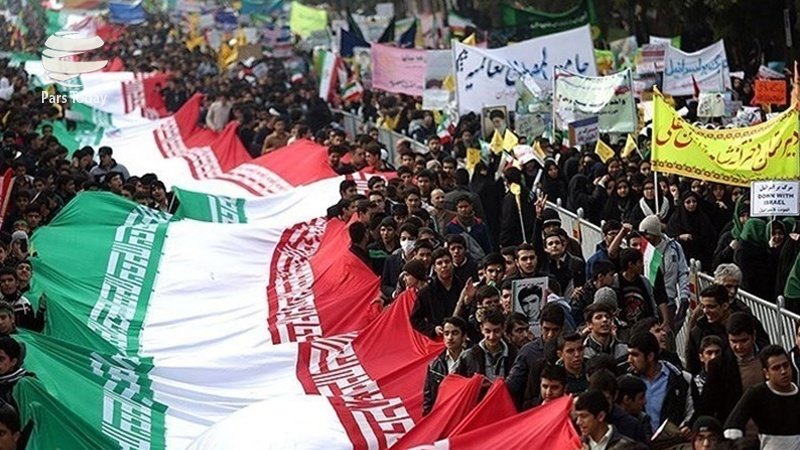For Iran as with Syria, a critical mass of unified and determined citizens will defeat aggressors

TEHRAN - No one can say whether U.S. President Donald Trump is changing his stripes. But he is sure as the perfection of the Muslim “Jannah” or the beauty of an exquisite Iranian rose or a fine carpet from Shiraz shaking up his usual allies, and not those merely in the U.S., but overseas, too.
It’s delightful to watch this happen, but one could be tempted to get too giddy with anticipations of real change when it’s possible Trump, as some are claiming, may literally be losing his mind under the pressures inherent in his job and those foisted on him from those who despise him, or he’s just being especially impulsive and his big mouth has gotten far too loose.
Some are claiming that before the end of this new year he will resign. Others can readily wonder that he has so angered the U.S. establishment, whether on the conservative or the faux liberal side of the political and social divide, that he may be, Allah forbid it, killed. Many have posited in the past that former President John F. Kennedy died because he wanted to utterly forbid the Zionists from getting hold of nuclear technology from any source and as well did not believe expansion of the nascent war in Vietnam in 1963 was a good idea.
The big-ticket item of controversy currently seems to be Trump’s decision to pull U.S. troops out of Syria. He seems to be pushing the honest recognition (finally) that the semi proxy war on Syria and the legitimate and even popular Assad government, despite all the destruction and carnage worse than anything the Mongols (non-Muslim “barbarians” at the time) meted out to the Muslim heartlands in 1258, has been an utter failure.
The goal was, of course, exactly what the Zionists have long wanted: just chaos and little or no organized government east and north of the Jordan River, and lots of dead people. Trump was also quoted as saying that “Iran can do what it wants” in Syria.
That goal has clearly backfired: Syria, though still in shock from all the destruction and death of its people and others, may be militarily stronger and more of a challenge to the Zionists than it has ever been since 1973 and the so-called “Yom Kippur” war which, had it not been for the lack of drive at a critical moment on the Golan, might have recovered the heights. Syria is said to be in possession of GPS guided missiles that can hit any target in “Israel”, and its air defense systems, augmented by Russia, are improving all the time.
Furthermore, Syria and Iraq are getting much closer, and that, in turn, means that Iraq and Iran are getting much closer, and meanwhile, Iran and Afghanistan have been involved in creative and constructive talks for some time. Think of it: the U.S. is not only obliged to leave Syria, but also to take its troops out of Iraq, and Trump has already ordered half the American soldiers in Afghanistan to leave, or some 7000 soldiers.
And the Zionists are having a hissy fit, especially over Syria and Iran. But again, imagine: Iran, Iraq, Syria and Afghanistan drawing together as friends and allies and not just to destroy the remaining terrorists in the region, but to enhance mutual trade, too, including China’s vast “Belt and Road” project.
Trump is of the opinion that U.S. sanctions and the abrogation of the JCPOA last May have materially weakened Iran to the point where he, as President, can’t be bothered by what Iran is doing in Syria, that Iranians and the government are SIMPLY or only struggling to survive now. I seriously doubt this is the case, but I hardly want to minimize the challenges U.S. sanctions and other threats represent. For example, porcine Defense Secretary Mike Pompeo, fatter than ever, recently demanded that Iran halt all missile development and no more testing.
Javad Zarif said “No!” to those demands, pointing out how the U.S. had unilaterally pulled out of the JCPOA to the horror of the entire world, except for the Zionists. One can imagine that had the U.S stayed true to the JCPOA and otherwise reached out a bit farther for normalization of relations with the Islamic Republic (and in turn stopped being a slave to the very insatiable demands of “Israel”), Iranian leaders like Zarif might well have been more open to Iran spending less of its precious resources on “defense” and more on its citizens.
Here’s the thing: Syria and Syrians managed to survive years of attack by Western powers and some Arabs, including hordes of Arab and even some European terrorists paid and equipped mostly by the U.S. and the British and Saudis.
It seems almost a miracle that the Assad government exists, so how is this possible? Ibn Khaldun’s Arabic concept of “assabiyya” seems the reason, or the solidarity and unity of enough Syrians ready to STAY unified to ward off their enemies. Syria, by the way, is a multi-religious and multi ethnic country. Iran is by the terms of the 1979 revolution “Islamic” but many Iranian citizens are of other faiths, too.
Iran can defeat whomever it wants, just like Syria has, with the same kind of determination and unity. Questions about more social liberalization in Iran and more democracy, while important, can wait until after Iran has been liberated from the burdens imposed on it by the U.S., Zionists and Saudis.

Leave a Comment